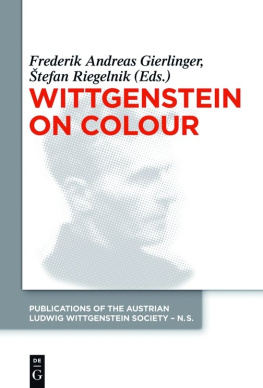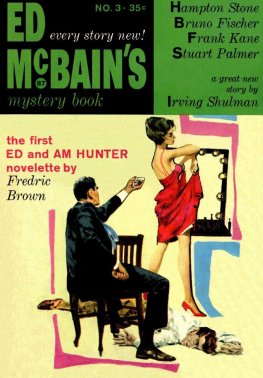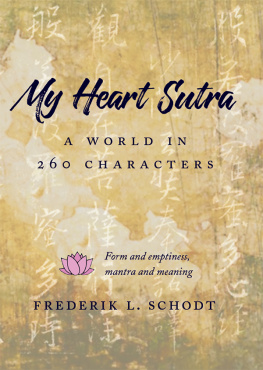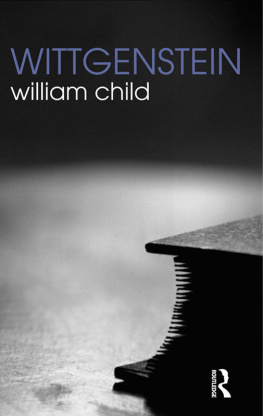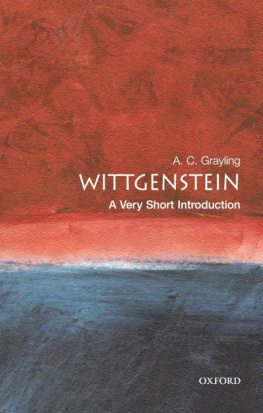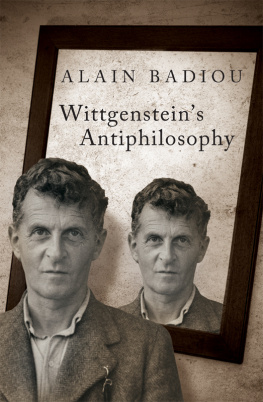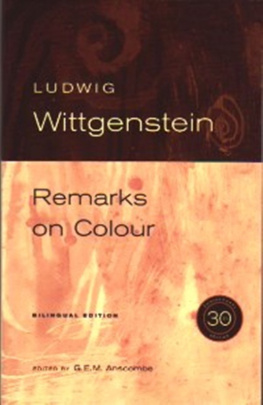Gierlinger Frederik A - Wittgenstein on Colour
Here you can read online Gierlinger Frederik A - Wittgenstein on Colour full text of the book (entire story) in english for free. Download pdf and epub, get meaning, cover and reviews about this ebook. year: 2014, publisher: De Gruyter, genre: Art. Description of the work, (preface) as well as reviews are available. Best literature library LitArk.com created for fans of good reading and offers a wide selection of genres:
Romance novel
Science fiction
Adventure
Detective
Science
History
Home and family
Prose
Art
Politics
Computer
Non-fiction
Religion
Business
Children
Humor
Choose a favorite category and find really read worthwhile books. Enjoy immersion in the world of imagination, feel the emotions of the characters or learn something new for yourself, make an fascinating discovery.
- Book:Wittgenstein on Colour
- Author:
- Publisher:De Gruyter
- Genre:
- Year:2014
- Rating:5 / 5
- Favourites:Add to favourites
- Your mark:
- 100
- 1
- 2
- 3
- 4
- 5
Wittgenstein on Colour: summary, description and annotation
We offer to read an annotation, description, summary or preface (depends on what the author of the book "Wittgenstein on Colour" wrote himself). If you haven't found the necessary information about the book — write in the comments, we will try to find it.
Wittgenstein on Colour — read online for free the complete book (whole text) full work
Below is the text of the book, divided by pages. System saving the place of the last page read, allows you to conveniently read the book "Wittgenstein on Colour" online for free, without having to search again every time where you left off. Put a bookmark, and you can go to the page where you finished reading at any time.
Font size:
Interval:
Bookmark:
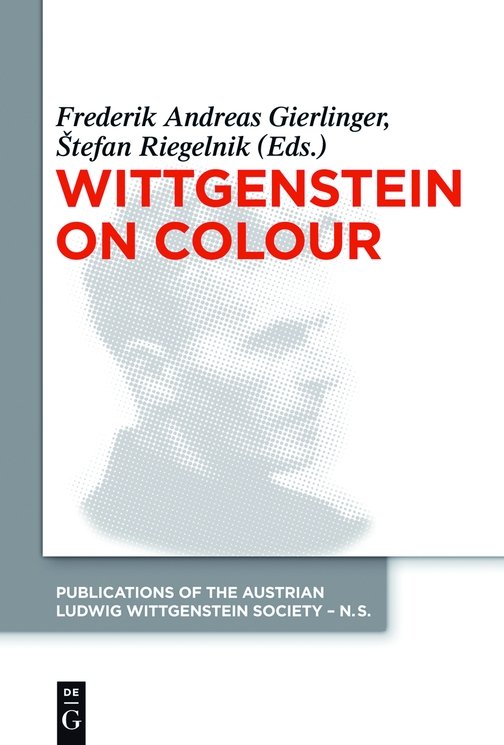
ANDREW LUGG received a B.Sc (Eng) from University College London and an M.S.E and a Ph.D. (in philosophy) from the University of Michigan. He taught at the University of Ottawa from 1973 to 2002. His work in philosophy initially focused on questions about the nature of scientific inquiry, later on the history of twentieth-century analytic philosophy, in particular the writings of Ludwig Wittgenstein and W. V. Quine. Lugg is the author of Wittgensteins Investigations 1-133 (2000/2004) and numerous articles in scholarly journals. In recent years he has been especially concerned with Wittgensteins writings on colour.
JOACHIM SCHULTE studied philosophy, sociology, and musicology at the universities of Bonn, Cologne and Frankfurt. He did his graduate studies in philosophy at Oxford, where he took his D.Phil. He has taught at the Universities of Bologna, Graz, Bielefeld and Zrich. He is known for his translations of philosophical and historical as well as literary works from English and Italian into German. His publications include numerous articles and four books on Wittgenstein as well as critical editions of his main works. He has worked extensively on Ludwig Wittgensteins Nachlass, and is a member of the board of editors of Wittgensteins Nachlass at Trinity College, Cambridge. Joachim Schulte is co-editor and co-translator of the revised 4th edition of Wittgensteins Philosophical Investigations. Currently, he is working chiefly on Wittgensteins last writings.
RICHARD HEINRICH studied philosophy at the University of Frankfurt and the University of Vienna where he held a teaching position until his retirement in 2013. His research interests include but are not limited to aesthetics, the history of art, philosophy of mathematics, and the history of philosophy, in particular 17th and 18th century philosophy. His work on Ludwig Wittgenstein focuses mainly on issues relating to the Tractatus logico-philosophicus and the relation of Wittgensteins early philosophical ideas to the writings of Immanuel Kant and Gottlob Frege. Currently he is working in the field of philosophy of literature.
GABRIELE M. MRAS is professor of philosophy at the Vienna University of Economics and Business (WU Wien) and teaches philosophy at the University of Vienna. She has held visiting professorships at numerous universities, among them the University of California, Berkeley and the University of Minnesota, Minneapolis. She has published books on early analytic philosophy, Frege and Russell and articles on Wittgenstein, in particular on his treatments of questions concerning indexicals, demonstratives, and the ascription of colour and number concepts. Currently she is working on a book on Russell and Bradley on the unity of judgement.
GARY KEMP received his PhD from the University of California at Santa Barbara. He has taught at the University of Waikato, the University of Glasgow, and the Vienna University for Economics and Business. He predominantly worked in the philosophy of logic and language, and on Frege, Russell, Quine, and Davidson, including a book on the last two. He has also published papers on aesthetics and philosophical themes in literature. More recently, he has published a paper comparing the later Wittgensteins views with Quines naturalism, and is currently working on a paper assessing Quines attitude towards metaphysics.
FREDERIK A. GIERLINGER studied economics, philosophy, mathematics and pedagogy in Vienna. He has taught introductory courses in philosophy at the University of Vienna and was a Visiting Researcher at the University of California, Berkeley and Rutgers University in New Jersey. His areas of specialization are philosophy of language, metaphysics, and epistemology. He has published mainly on issues relating to the philosophical writings of late Ludwig Wittgenstein. Currently he is working on the status of moral judgments and questions concerning moral development.
HERBERT HRACHOVEC studied history, philosophy, and theology, as well as Germanic languages and literature in Vienna and Tbingen. He held fellowships and visiting appointments at the universities of Oxford, Mnster, Harvard, Berlin, Essen, Weimar and retired from his position at the Department of Philosophy at the University of Vienna in 2012. His publications cover a wide range of topics with a focus on analytic philosophy, metaphysics, and aesthetics. With respect to Wittgenstein he has written on issues relating to his Nachlass and on a broad selection of themes in his philosophy, early and late. In recent years the focus of his work has been the philosophy of technology and issues relating to new media.
MARTIN KUSCH is professor for philosophy of science and epistemology at the University of Vienna. Prior to coming to Vienna in 2009, he held a chair in philosophy and sociology of science at the University of Cambridge. His main book publications are Language as Calculus vs. Language as Universal Medium (1989), Foucaults Strata and Fields (1991), Psychologism (1995), Psychological Knowledge (1998), The Shape of Actions (with H. M. Collins, 1999), Knowledge by Agreement (2002), and A Sceptical Guide to Meaning and Rules: Defending Kripkes Wittgenstein (2006). He is currently completing a book entitled Wittgensteins Epistemological Investigations. In 2014 he was awarded an ERC Advanced Grant for a project entitled The Emergence of Relativism: Historical, Philosophical and Sociological Perspectives.
BARRY STROUD is Willis S. and Marion Slusser Professor of Philosophy at the University of California, Berkeley. He received his B.A. in philosophy from the University of Toronto and a Ph.D. from Harvard University. He has written extensively on philosophical skepticism, David Hume, and the later philosophy of Wittgenstein, and more recently on the metaphysical status of colours, causality, necessity, and values.
Andrew Lugg
Der Philosoph will die Geographie der Begriffe beherrschen.
(MS 137, 63a, dated 1 July 1948)
transparency, questions unmentioned in the publicity material and mostly missed or disregarded in the secondary literature.
Remarks on Colour comprises observations that Wittgenstein penned during the last fifteen or so months of his life. His literary executors Anscombe, Rush Rhees and G.H. von Wright apparently reckoned the whole of this material might well be published, as it gives a clear sample of first-draft writing and subsequent selection. Anscombe allows that much of the material written not subsequently recycled is of great interest but decided this is more obvious in the German version of her preface that the chosen method of publication involves the least editorial intervention (Editors Preface). Judging from how she ended up presenting the material, her thought was that Wittgensteins remarks would be most satisfactorily published in three separate units Part I extracted from MS 176, Part II extracted from MS 172 and Part III extracted from MS 173 (for catalogue numbers see von Wright 1993b). Not without reason Anscombe seems to have considered the relatively small number of other remarks on colour in the final six items in von Wrights catalogue, MSS 172-177, incidental and safely omitted. Certainly there is nothing about colour to speak of in the remarks of MS 172, MS 173 and MS 176 not included in Remarks on Colour or in MS 174, MS 175 and MS 177, manuscripts mostly reproduced in On Certainty or volume 2 of Last Writings on the Philosophy of Psychology .
It would be shabby to quarrel with Anscombes presentation of the material. Part I, the part written last, is better organised than Part III, from which it was largely drawn, and the remarks seemingly composed during the process of selection usefully fill out the discussion. (Anscombe overstates the degree to which Part I derives Part III when she describes the material in her Editors Preface as a revision of earlier material with few additions since about a quarter of the remarks are new.) Wittgensteins ostensible aim in Part I is to express his most recent thinking about colour simply and sharply, and it is tempting to think little is lost when the material in Part III that was not recycled is relegated to second place, Anscombes claim in her preface about its great interest notwithstanding. Whether or not Part I represents Wittgensteins considered opinion, there is plenty here for philosophers to get their teeth into, not least his treatment of the problem of which colours are primary, the nature of various kinds of impossible colour and questions regarding the phenomenon of colour blindness. Moreover placing Part II or Part III before Part I would not have made for a better book. The import of the 20 remarks of Part II is not easily fathomed, and starting with the 350 remarks of Part III would have crowded out the 88 remarks of Part I.
Font size:
Interval:
Bookmark:
Similar books «Wittgenstein on Colour»
Look at similar books to Wittgenstein on Colour. We have selected literature similar in name and meaning in the hope of providing readers with more options to find new, interesting, not yet read works.
Discussion, reviews of the book Wittgenstein on Colour and just readers' own opinions. Leave your comments, write what you think about the work, its meaning or the main characters. Specify what exactly you liked and what you didn't like, and why you think so.

